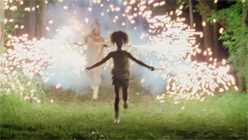
3. A mess of sweaty poor people, children included, gather in a shack before an unnamed storm (which we know to be Katrina) demolishes southern Louisiana. Someone dumps a huge crate of fresh-caught seafood on the table, and in that instant the messy vitality of life takes over the room and the movie. The most real moment in any film this year, it’s from Beasts of the Southern Wild, Benh Zeitlin’s admirable child’s-eye fable. (The score is pretty darn irresistible, to boot.)

4. The first 15 minutes or so of Zero Dark Thirty consists of a nasty and prolonged exercise in torture that challenges us to stake our stance in the post-9/11 moral thicket. The movie proceeds to steadily and concertedly erase our ambivalence and discomfort over the next two hours, and that’s the copout that director Kathryn Bigelow and writer Mark Boal deserve condemnation for. Filmmakers who maintain that they are storytellers first and foremost, but still want to be part of a nitty-gritty, real-world, adult conversation, are engaged in a form of self-deception that’s harmless enough until we join in the charade. Nonetheless, the beginning of Zero Dark Thirty raises all sorts of useful questions, including the realization (yet again) that movies inevitably oversimplify and dilute actual events. (A classic exception, always worth revisiting, is The Battle of Algiers.)

5. There’s much to loathe and dismiss about The Dark Knight Rises, but let’s stick to its reprehensible association of the Occupy movement with anarchy in the blink-and-you-missed-it scene of the underclass throwing Park Avenue upper-crusters out on the street. Here’s the main takeaway from Christopher Nolan’s muddled Batman movie: Any attempt to inject current events, class consciousness and socio-political complexities into a comic-book movie requires more skill and subtlety than Hollywood — or an imported British wunderkind — is capable of.

6. Lincoln is a work of high aims and intelligence, as well as probing scholarship and studious acting, but it betrays its ideals with a single camera move at the end. At his behest, the black housekeeper (S. Epatha Merkerson) of abolitionist Sen. Thaddeus Stevens (Tommy Lee Jones) reads aloud a proposed amendment to the Constitution banning slavery. Instead of a static two-shot that underlines the characters’ relationship, Steven Spielberg inexorably zooms in on Jones until Merkerson is out of the frame. The director’s choice reflects Hollywood’s inability to trust the viewer, and the prevailing mania to provide a visual and/or aural “action” every second. But this untoward emphasis on Stevens’ reaction unintentionally reveals that, at the end of the day, the filmmakers believe that slavery thing was really all about white people.

7. Going back to Distant Voices, Still Lives (1988) and The Long Day Closes (1992), if not previously in his short films, the acutely sensitive British director Terence Davies has long displayed a talent for conceiving and staging scenes in which reality and imagination dissolve into each other, and time becomes as fluid as air. The Deep Blue Sea, starring Rachel Weisz as a woman who knowingly trades security for passion during World War II, has a bravura sequence in the tube during an air raid that employs pure cinema to devastating emotional effect. It’s a moment that Joe Wright (Anna Karenina) and Tom Hooper (Les Miserables) labor to match unsuccessfully.

8. Christopher Walken is always a pleasure to watch, and I was touched in an unexpected way by his soulful performance in the bloody comedy Seven Psychopaths. He had the exceedingly demanding job of making an oddball empathetic and believable for the duration of an entire (and absurdly overlong) picture, and did it without breaking a sweat. That said, Walken’s portrayal of a concert cellist and quietly inspirational teacher diagnosed with Parkinson’s in A Late Quartet will stick with me longer. Given just a handful of lines, Walken beautifully expressed his character’s loss and sorrow with a range of subtle physical movements and gestures. Unfortunately, the movie devoted most of its time to other, far less interesting characters.

9. Choose life. It’s not always that easy, as Freddie Quell will be glad to remind you. The endlessly fascinating and remarkable Oslo, August 31st follows a rehabbing, upper-middle-class (if that still exists) drug addict on his first day back in the big city. Director Joachim Trier confronts the expectations of a dramatic, episodic day in the life—replete with symbolic and “meaningful” encounters and incidents — and concocts instead a bubbling, impressionistic stream of consciousness. I recall (and savor) the mood of the piece but not any jaw-dropping moment or image, which reflects a greater accomplishment on the director’s part.













